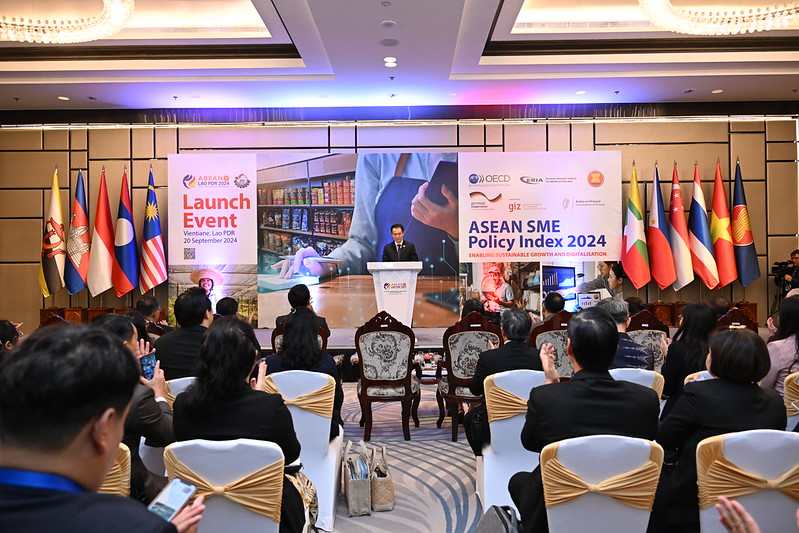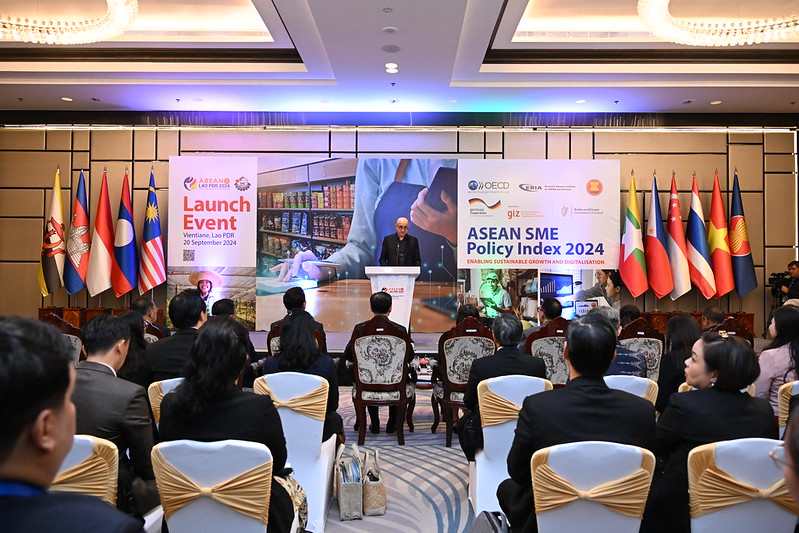Vientiane, September 20 (AseanAll) — The Association of Southeast Asian Nations (ASEAN) through the ASEAN Coordinating Committee on Micro, Small and Medium Enterprises (ACCMSME), the Economic Research Institute for ASEAN and East Asia (ERIA), and the Organisation for Economic Co-operation and Development (OECD) have jointly released the ASEAN SME Policy Index 2024.
The report highlights significant progress in improving the policy and regulatory frameworks for small and medium-sized enterprises (SMEs) as well as micro enterprises across Southeast Asia, despite recent global shocks – a one in a one hundred years pandemic, geopolitical tensions, and disruptions in global supply chains.
The ‘SME Policy Index ASEAN 2024: Enabling Sustainable Growth and Digitalisation’, provides a comprehensive assessment of SME development policies across ASEAN Member States, benchmarking progress compared to the previous edition of the report in 2018 in eight policy dimensions: productivity, technology, and innovation; environmental policies and SMEs; access to finance; access to markets and internationalisation; institutional framework; legislation, regulation, and tax; entrepreneurial education and skills; and social enterprises and inclusive SMEs.
The 2024 edition expands upon previous assessments, introducing new indicators focused on digitalisation, SME greening, inclusive business models and policy responses to the COVID-19 pandemic.
Key findings from the 2024 Policy Index reveal that ASEAN Member States have made commendable strides enhancing their respective SME policy frameworks. Average scores across countries and dimensions have improved since the 2018 assessment, indicating a growing recognition of SMEs as drivers of inclusive and sustainable economic growth and innovation.
The report noted that SME policy frameworks have increased in size and scope, becoming more complex and offering SMEs a greater variety of customised support. Room for improvement remains to improve the collaboration between institutions and across levels of governments, providing an integrated suite of policies and programmes to ensure SME development. There is also clear evidence of convergence of regional SME policies with more regional initiatives such as ASEAN Access, ASEAN SME Academy, and exploring the establishment of the regionally comparable and recognisable unique business identification number (UBIN). The report also underscores the resilience of ASEAN’s SMEs in the face of the COVID-19 crisis, with governments providing timely relief measures while planning for long-term structural improvements to boost SME productivity through digitalisation and infrastructure enhancements. However, challenges remain. A significant number of SMEs are still in the early stages of adopting environmentally friendly and digital technologies, which could limit their competitiveness without targeted government support. Additionally, issues such as business informality and fragmented policy implementation continue to impede SME development.
Speaking at the launching event organised by the Ministry of Industry and Commerce of Lao PDR through its Micro, Small and Medium Enterprise Promotion Agency, Malaithong Kommasith, Minister of Industry and Commerce of Lao PDR and Chair of the ASEAN Economic Ministers’ Meeting 2024, said, “The ASPI 2024 is one of significant tools in assessing the progress and achievements of SME promotion and development in ASEAN. The publication informs us the milestones that have been achieved on SME promotion and some of the gaps that need to be further improved, particularly facilitating the recovery from the pandemic and adaptation their business performance during the world economic complication, disruptive of global supply chain and geopolitical tension”.

‘The OECD has been enriched by incorporating Southeast Asian experiences and perspectives on a wide range of topics into our work, underpinned by our Southeast Asia Regional Programme which celebrated its 10th anniversary this year. Economic growth in Southeast Asia has been resilient, driven by robust domestic and regional demand and the services sector’s continued recovery,’ OECD Secretary-General Mathias Cormann said. ‘We have also seen broader and better-tailored support to SMEs, helping them to become more digitally savvy and better positioned to compete in the global market. The OECD will continue working with the countries in the region on reforms to build an SME-friendly business environment, and help the region optimise its pathway towards long-term sustainable, resilient and inclusive growth and prosperity.’
Prof. Tetsuya Watanabe, President of ERIA, highlighted the importance of ASPI 2024 for the future of SMEs in ASEAN, saying, ‘These findings underscore the need for continued, targeted policy action to fully unlock the potential of ASEAN’s SMEs. The Index provides targeted recommendations to address these challenges, drawing on regional and international best practices. We hope it will be a valuable resource for policymakers as they work to create more conducive environments for SMEs to grow and thrive.’
Echoing the theme of the ASPI 2024, Satvinder Singh, Deputy Secretary-General of ASEAN for ASEAN Economic Community, shared ASEAN’s aspirations to accelerate intra-ASEAN trade by empowering MSMEs to be better integrated into cross-border trade through e-commerce. He also highlighted their crucial roles in facilitating ASEAN’s shift towards a more sustainable economy.

The chair of ACCMSME, Joanne Tan, extended her deepest gratitude to the ASEAN Member States, ERIA and OECD for their invaluable contributions and dedication in the preparation of the ASPI 2024. She also reiterated the ACCMSME’s steadfast commitment in promoting and enabling MSME growth across the region, and to ensure that MSMEs remain at the core of ASEAN’s post-2025 vision.
The launch was participated by representatives from the ASEAN Economic Ministers’ Meeting, Timor Leste, ACCMSME, ASEAN Secretariat, Germany, Ireland, ERIA and OECD. The ASEAN SME Policy Index 2024 is the result of a two-year collaboration between ACCMSME, ERIA, and OECD, and is made possible with the support of the German Federal Ministry for Economic Cooperation and Development (BMZ), implemented by the Deutsche Gesellschaft für Internationale Zusammenarbeit (GIZ) GmbH, and the Government of Ireland.